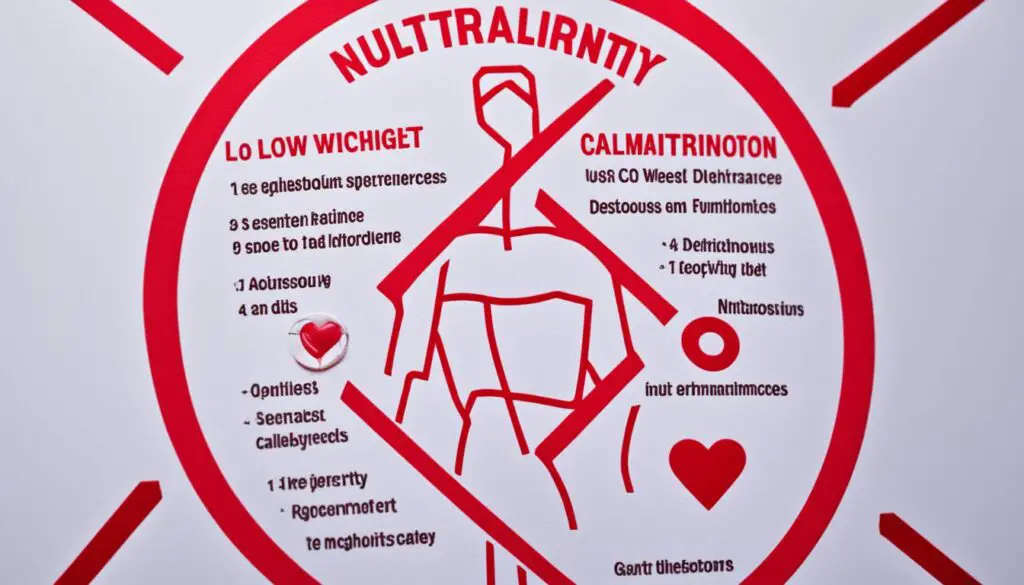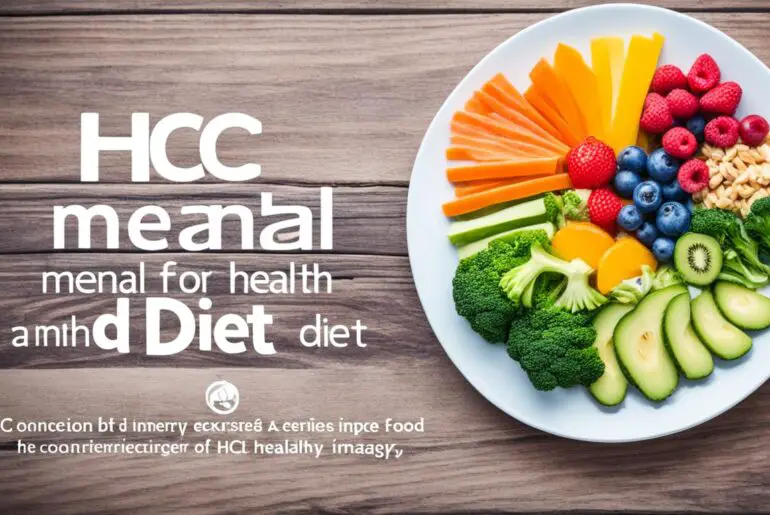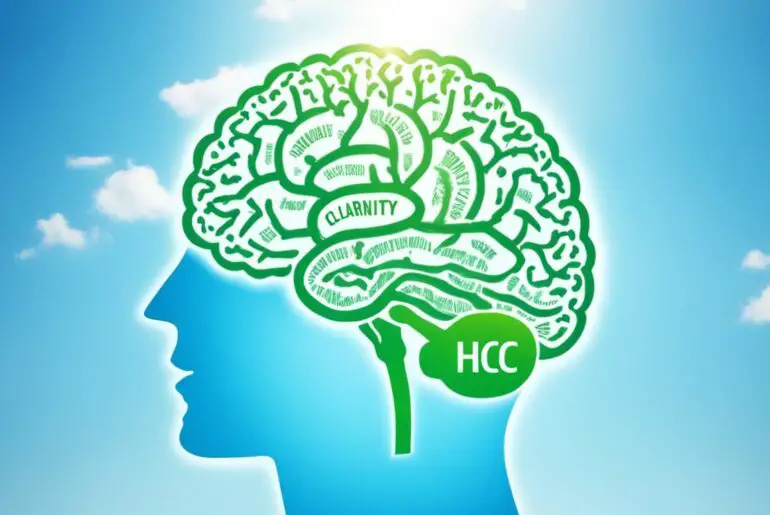Did you know that the HCG diet has gained popularity as a weight loss solution?
Many individuals have turned to this approach in hopes of achieving their weight loss goals and improving their mental wellness. However, there are important considerations to keep in mind before embarking on the HCG diet journey.
The HCG diet involves severe calorie restriction and the use of the hormone human chorionic gonadotropin (HCG). It claims to promote weight loss while resetting the metabolism. However, the FDA has cautioned against using HCG for weight loss due to its lack of proven effectiveness and potential health risks.
In this article, we will explore the HCG diet, its safety concerns, and alternative approaches that prioritize holistic weight loss and mental wellness. It’s important to prioritize your overall wellbeing and consider safer and sustainable weight loss methods.
Key Takeaways:
- The HCG diet is a controversial weight loss approach that involves severe calorie restriction and the use of the hormone HCG.
- The FDA has advised against using HCG for weight loss due to lack of evidence and potential health risks.
- Emotional wellbeing plays a significant role in weight loss and overall mental health. Prioritize self-care and adopt a holistic approach.
- Instead of the HCG diet, consider a balanced diet, regular exercise, and consulting with healthcare professionals for support in achieving sustainable weight loss.
- Hormonal imbalances can impact weight management and mental health. Take a holistic approach to address hormonal balance through nutrition, exercise, and stress management.
What is the HCG Diet?
The HCG diet is a weight loss plan that was originally published in 1954 by Dr. A.T.W. Simeons. It involves taking small doses of HCG hormone (through injections or drops) while following a very low-calorie, high-protein diet. The diet claims to target fat loss and reset the metabolism to promote long-term weight maintenance. However, the FDA has not approved the use of HCG for weight loss, and severe calorie restriction can have negative effects on overall health.
Despite its historical popularity, the HCG diet remains controversial due to its reliance on hormone therapy and calorie restriction. Supporters argue that the HCG hormone aids in fat burning and reduces hunger, while opponents cite the lack of scientific evidence and potential health risks.
How the HCG Diet Works
The HCG diet involves multiple phases that typically span several weeks. During the first phase, known as the loading phase, individuals are encouraged to consume high-calorie foods for a few days. This is followed by the main phase, which includes the calorie-restricted diet and HCG hormone administration. The final phase, called the maintenance phase, gradually introduces more foods while discontinuing the hormone therapy. Throughout the diet, individuals are advised to track their progress and make adjustments as needed.
Proponents of the HCG diet claim that the hormone triggers the release of stored fat, allowing individuals to burn excess weight more efficiently. Meanwhile, the low-calorie diet is believed to reset the metabolism and promote lasting weight loss. However, it’s important to note that the FDA has not approved HCG for weight loss purposes, as studies have not shown it to be an effective or safe method of achieving sustainable weight management.
Limitations and Risks
The HCG diet’s severe calorie restriction, typically less than 500 calories per day, may lead to nutrient deficiencies and other negative health effects. Very low-calorie diets can cause fatigue, dizziness, muscle loss, and impaired immune function. Furthermore, the long-term sustainability of the diet raises concerns, as severely restricted calorie intake is not feasible or healthy for most individuals.
The FDA has issued warnings about the use of HCG for weight loss, highlighting the lack of evidence to support its effectiveness and the potential for serious side effects. These side effects may include fatigue, irritability, depression, fluid buildup, and swelling of the breasts in males. There are also concerns about an increased risk of cancer and the formation of gallstones due to the hormonal changes and extreme calorie restriction.
Given the lack of scientific evidence and potential risks associated with the HCG diet, it is advisable to explore safer and more sustainable weight loss methods. Prioritizing a balanced diet, regular exercise, and a holistic approach to overall wellbeing is key to achieving and maintaining a healthy weight.
Safety Concerns of the HCG Diet

The HCG diet may promise rapid weight loss, but it is not without its safety concerns. The FDA has issued a warning against the use of the HCG diet for weight loss due to its ineffectiveness and potential health risks.
Side effects associated with the HCG diet can range from mild to severe. Common side effects include fatigue, irritability, restlessness, and depression. Additionally, fluid buildup and swelling of the breasts in males have been reported.
One of the major safety concerns of the HCG diet is the potential cancer risk. Severe calorie restriction combined with the use of HCG hormone may disrupt the body’s hormonal balance, potentially increasing the risk of cancer development.
Another worrying issue is the formation of gallstones. The HCG diet involves a very low-calorie intake, which can lead to imbalances in cholesterol metabolism and an increased likelihood of gallstone formation.
Before considering any weight loss method, including the HCG diet, it is crucial to prioritize safety and consult with a healthcare professional. They can provide guidance and ensure that your weight loss journey is based on scientifically-proven and safe methods.
“The HCG diet carries significant safety concerns, including potential side effects, cancer risk, and gallstone formation. Consult with a healthcare professional to ensure your weight loss journey is safe and effective.”
The Importance of Emotional Wellbeing in Weight Loss
When it comes to weight loss, many people focus solely on the physical aspect, such as calorie counting and exercise routines. However, it’s important to remember that our mental and emotional wellbeing also play a crucial role in the journey towards a healthier lifestyle. Taking care of our mental health is just as important as taking care of our physical health when it comes to sustainable weight loss.
Emotional wellbeing refers to our ability to cope with everyday challenges, manage stress, and maintain a positive outlook on life. Incorporating self-care practices and a holistic approach to weight loss can greatly enhance our emotional wellbeing, leading to more successful and fulfilling weight loss journeys.
The Impact of Emotional Wellbeing on Weight Loss
Our emotional state and mental health can significantly influence our eating habits and overall weight management. Stress, anxiety, and other negative emotions can lead to emotional eating, overeating, and cravings for unhealthy foods. This can hinder weight loss progress and make it difficult to adopt healthier habits.
On the other hand, prioritizing emotional wellbeing can lead to more mindful and self-aware choices in our diet and lifestyle. By addressing the underlying emotional factors that contribute to weight gain or unhealthy habits, we can develop a healthier relationship with food and make sustainable changes for long-term success.
By focusing on emotional wellbeing alongside physical health, we can create a solid foundation for sustainable weight loss.
The Role of Self-Care in Weight Loss
Incorporating self-care practices into our daily routine is crucial for maintaining emotional wellbeing during the weight loss journey. Self-care involves engaging in activities that promote relaxation, stress reduction, and overall mental and emotional balance.
Some self-care practices that can support weight loss include:
- Regular exercise to boost endorphins and improve mood
- Getting enough sleep to promote overall wellbeing and regulate hormones
- Engaging in activities that bring joy and reduce stress
- Practicing mindfulness and meditation to cultivate a positive mindset
Seeking Support for Emotional Wellbeing
Weight loss journeys can sometimes feel overwhelming, and having a support system in place can make a significant difference in our emotional wellbeing. Seeking support from loved ones, joining support groups, or working with healthcare professionals or therapists can provide valuable guidance, encouragement, and accountability.
Connecting with others who share similar goals and challenges can create a sense of community and reduce feelings of isolation. It’s important to remember that we don’t have to go through the weight loss journey alone.
Incorporating self-care and prioritizing emotional wellbeing alongside physical health is essential for a holistic approach to weight loss. By addressing our emotional needs and engaging in practices that promote mental and emotional balance, we can achieve long-lasting results and cultivate a healthier, happier lifestyle.
Safer Alternatives to the HCG Diet
Instead of resorting to the potentially unsafe and ineffective HCG diet, it’s recommended to opt for healthier alternatives that promote sustainable weight loss and overall wellbeing. By adopting a healthy lifestyle, focusing on a balanced diet, incorporating regular exercise, and embracing sustainable methods, you can achieve your weight loss goals without compromising your health.
A balanced diet plays a crucial role in sustainable weight loss. By consuming nutrient-dense foods that provide essential vitamins, minerals, and macronutrients, you can fuel your body optimally. Incorporate plenty of fruits, vegetables, whole grains, lean proteins, and healthy fats into your diet. Avoid crash diets and extreme calorie restrictions, as they can be detrimental to your overall health.
Regular exercise is another vital component of a healthy lifestyle and effective weight loss. Engage in activities that you enjoy, such as cycling, swimming, jogging, or dancing. Aim for at least 150 minutes of moderate-intensity exercise or 75 minutes of vigorous-intensity exercise per week, as recommended by health experts.
“Adopting a sustainable approach to weight loss involves long-term lifestyle changes rather than relying on fad diets or quick fixes.”
It is important to embrace sustainable methods that allow for gradual weight loss, as this promotes long-term success. Avoid falling for promises of rapid weight loss or miracle solutions. Focus on creating sustainable habits that you can maintain in the long run, such as portion control, mindful eating, and finding healthy alternatives to your favorite indulgences.
Consulting with a healthcare provider or a registered dietitian can provide personalized guidance and support on your weight loss journey. They can help create a tailored plan that takes into account your individual needs, preferences, and any underlying health conditions. The guidance of a professional can ensure that you approach weight loss in a safe and sustainable manner.
By prioritizing a healthy lifestyle, embracing a balanced diet, regular exercise, and sustainable methods, you can achieve your weight loss goals while prioritizing your overall health and wellbeing.
The Role of Hormones in Weight and Mental Health

Hormones play a crucial role in both weight management and mental health. Our body’s hormone production and balance can significantly impact our weight and emotional wellbeing. Hormonal imbalances can contribute to weight gain, difficulty losing weight, and emotional instability, making it essential to understand and address these imbalances to achieve optimal health.
A holistic approach to weight and mental health involves addressing hormonal imbalances through various lifestyle factors. Here are some key areas to focus on:
Proper Nutrition:
Consuming a balanced diet that supports hormonal balance is crucial. Include nutrient-dense foods like fruits, vegetables, whole grains, lean proteins, and healthy fats in your meals. These foods provide essential vitamins, minerals, and antioxidants that promote hormonal health.
Regular Exercise:
Exercise aids in hormone regulation by stimulating the production of certain hormones like endorphins and growth hormone, which play a role in weight management and mental wellbeing. Engaging in regular physical activity can improve hormone balance and promote a healthy weight.
Stress Management:
Chronic stress can disrupt hormone levels, leading to weight gain and mental health issues. Adopt stress management techniques such as meditation, deep breathing exercises, yoga, or engaging in hobbies to reduce stress and promote hormonal balance.
Adequate Sleep:
Lack of sleep can disrupt hormone production, specifically those related to hunger and satiety, leading to weight gain. Aim for 7-9 hours of quality sleep per night to support hormonal balance and overall wellbeing.
Addressing hormonal imbalances through these lifestyle factors can help support both physical and mental wellbeing. By taking a holistic approach and making sustainable changes, you can achieve a healthier weight and promote long-term mental health.
Setting Realistic Weight Loss Goals
When it comes to weight loss, setting realistic goals is crucial for long-term success. It’s understandable to have ambitious aspirations, but aiming for drastic weight loss within a short period can often lead to disappointment and frustration. Instead, consider focusing on small, achievable milestones that contribute to sustainable weight loss.
By setting realistic goals, you give yourself the opportunity to stay motivated and maintain accountability throughout your weight loss journey. Breaking down larger goals into smaller steps allows you to celebrate each milestone you reach, serving as a source of encouragement along the way.
Remember, progress takes time and effort. Prioritizing your overall health and well-being is more important than achieving a specific number on the scale. Embrace the process and focus on making gradual, sustainable changes to your lifestyle.
To help you in setting realistic weight loss goals, here are some tips:
- Consult with healthcare professionals: Seek guidance from a registered dietitian or healthcare provider who can help you create a personalized weight loss plan based on your specific needs and goals.
- Consider your current lifestyle: Take into account your daily routine, responsibilities, and commitments. Set goals that are realistic and feasible within the context of your life.
- Focus on overall health: Shift your mindset from solely focusing on weight loss to prioritizing your overall health and well-being. This includes incorporating nutritious foods, regular exercise, and self-care into your daily routine.
- Track your progress: Keep a record of your achievements and milestones to stay motivated. This can be done through a journal, an app, or any other method that works for you.
- Seek support: Surround yourself with individuals who share similar goals and challenges. Joining a weight loss support group or enrolling in a comprehensive weight loss program can provide the necessary accountability and motivation.
“Setting realistic weight loss goals is key to staying motivated and maintaining accountability on your journey to a healthier you.”
Remember, your weight loss journey is unique to you. Celebrate every achievement, no matter how small, and remember that sustainable weight loss is a continuous process. Focus on building a healthier lifestyle that promotes long-term well-being rather than simply chasing a number on the scale.
Stay committed, believe in yourself, and celebrate each milestone along the way!
| Benefits of Setting Realistic Goals | Key Takeaways |
|---|---|
| 1. Increased Motivation | Setting achievable goals keeps you motivated and gives you a sense of accomplishment as you reach each milestone. |
| 2. Sustainable Weight Loss | By setting realistic goals, you’re more likely to adopt healthy habits that promote long-term weight loss. |
| 3. Improved Mental Well-being | Realistic goals reduce stress, promote a positive mindset, and prevent feelings of failure or disappointment. |
| 4. Enhanced Accountability | Setting achievable goals helps you stay accountable to yourself and your weight loss journey. |
The Benefits of Weight Loss Support

When embarking on a weight loss journey, having support can make all the difference in achieving your goals. Surrounding yourself with like-minded individuals who understand the challenges and successes of weight loss can provide invaluable accountability, motivation, and guidance. Whether you choose to join a group of peers, seek professional guidance, or enroll in a comprehensive weight loss program, the benefits of weight loss support are numerous.
The Power of Accountability
Accountability is a powerful tool when it comes to achieving weight loss goals. Through weight loss support, you have a network of individuals who are invested in your success, cheering you on and holding you accountable for your actions. This shared responsibility promotes consistency and helps you stay on track, even when facing obstacles or temptations.
Motivation to Keep Going
Weight loss support provides an invaluable source of motivation throughout your journey. When others are striving for similar goals, you can draw inspiration and encouragement from their progress and success. Sharing your own achievements and setbacks with others who understand firsthand can reignite your motivation, helping you stay focused and committed to your weight loss goals.
The Power of Group Support
Group support offers a sense of community and understanding that can’t be replicated. Engaging with individuals who share your experiences fosters a supportive environment where you can openly share challenges, seek advice, and celebrate victories together. This group dynamic cultivates empathy, connection, and a sense of belonging, creating a positive and empowering space for your weight loss journey.
“Surrounding yourself with individuals who share similar goals and challenges can make the weight loss process more enjoyable and sustainable.”
Professional Guidance and Expertise
Seeking professional guidance brings a wealth of knowledge and expertise to your weight loss journey. From registered dietitians to fitness trainers, these professionals understand the complexities of weight loss and can provide personalized advice and strategies tailored to your unique needs. Their guidance ensures that you’re making informed decisions and following a safe and effective approach to weight loss.
Weight loss support not only provides accountability, motivation, and expert guidance but also creates an environment where you can learn from others, gain new perspectives, and build lifelong friendships. Together, you can navigate the challenges, celebrate the milestones, and ultimately achieve your weight loss goals.
Visualizing Your Weight Loss Goals

Visualization is a powerful tool when it comes to achieving weight loss goals. Taking time each day to visualize yourself at your desired weight and feeling your best can help increase motivation and focus. Visualization can provide mental clarity and a sense of purpose on your weight loss journey.
| Benefits of Visualization | How to Visualize |
|---|---|
|
|
Creating a vision board with inspiring quotes and images can serve as a visual reminder of your goals. Find images that represent your desired physique, healthy meals, and activities you enjoy. Display the vision board in a prominent place where you will see it every day. The visual representation of your aspirations will keep you motivated and focused on your weight loss journey.
The brain responds well to visual cues, and visualization can help you maintain mental clarity and focus throughout your weight loss journey. By regularly visualizing your goals and the positive changes you want to make, you can fuel your motivation and stay on track towards a healthier, happier you.
The Power of Mental Imagery
“Visualization is a technique that can bridge the gap between where you are and where you want to be. By mentally rehearsing your success, you can increase your belief and confidence, which are essential for achieving your weight loss goals.” – Dr. Jessica Lee, Psychologist
Conclusion
The HCG Diet claims to offer a path to mental wellness through weight loss, but it lacks scientific evidence and may carry health risks. To achieve long-term success in weight loss and mental wellness, it is crucial to prioritize a holistic approach that focuses on safe and sustainable methods.
This includes adopting a healthy lifestyle that embraces balanced nutrition, regular exercise, and emotional wellbeing. Rather than resorting to extreme calorie restrictions and hormone therapy, it is recommended to seek guidance from healthcare professionals who can create personalized weight loss plans.
By prioritizing mental wellness alongside physical health, individuals can achieve safe and effective weight loss, leading to improved overall wellbeing. Embracing holistic weight loss methods supports sustainable changes that prioritize long-term health and holistic well-being.
FAQ
What is the HCG Diet?
The HCG diet is a weight loss plan that involves taking small doses of HCG hormone while following a very low-calorie, high-protein diet.
Are there any safety concerns with the HCG Diet?
Yes, the FDA has warned against the use of HCG for weight loss due to safety concerns and potential side effects.
What are the potential side effects of the HCG Diet?
Side effects of the HCG diet can include fatigue, irritability, restlessness, depression, fluid buildup, swelling of the breasts in males, and concerns about an increased risk of cancer and gallstone formation.
Why is emotional wellbeing important in weight loss?
Emotional wellbeing plays a significant role in weight loss and overall mental health, and it is crucial to prioritize self-care and adopt a holistic approach.
What are some safer alternatives to the HCG Diet?
Safer alternatives to the HCG diet include adopting a healthy lifestyle that includes a balanced diet filled with nutrient-dense foods and regular physical activity.
How do hormones affect weight and mental health?
Hormonal imbalances can contribute to weight gain, difficulty losing weight, and emotional instability. Addressing hormonal imbalances is important for both physical and mental wellbeing.
How do I set realistic weight loss goals?
Setting realistic weight loss goals involves aiming for small, achievable milestones and breaking down larger goals into smaller steps for sustainability.
What are the benefits of weight loss support?
Having support during the weight loss journey can increase chances of success. Joining a group, seeking guidance from professionals, or enrolling in a weight loss program provides support, accountability, and motivation.
How can visualization help with weight loss goals?
Visualization is a powerful tool in achieving weight loss goals. Taking time to visualize yourself at your desired weight can increase motivation and focus throughout the journey.
Is the HCG diet a safe and effective path to mental wellness?
No, the HCG diet is not supported by scientific evidence and may pose health risks. Prioritizing mental wellness and adopting a holistic approach to weight loss is recommended.




